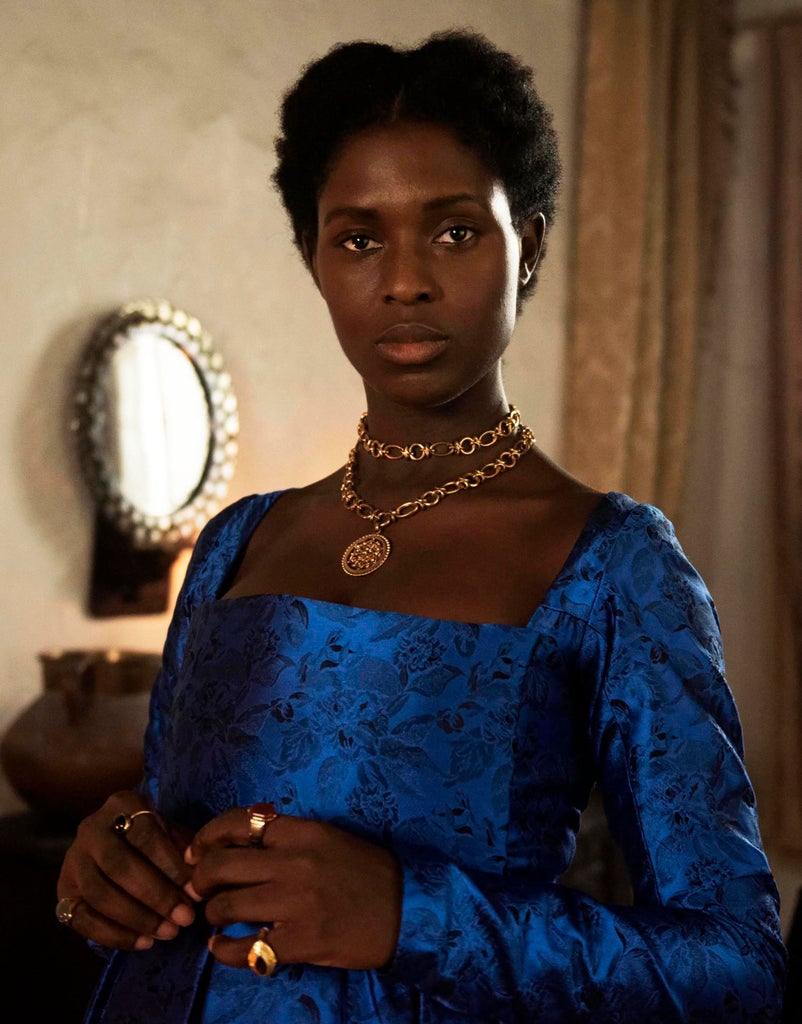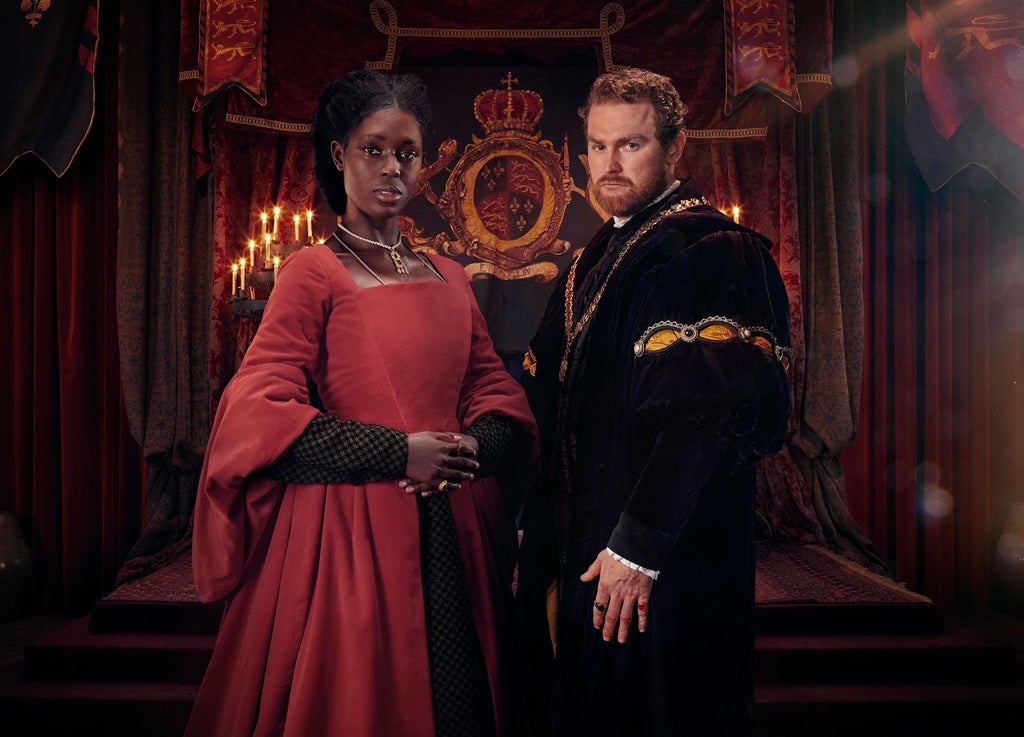In a country with as tight a grip on the Tudor monarchy’s narrative as Britain, it’s not surprising that after dozens of depictions of the 16th century royal family, we still can’t stop talking about them. And Anne Boleyn is no exception.
The latest telling of the story of Henry VIII’s second wife comes from Channel 5 and features Queen & Slim‘s Jodie Turner-Smith in the starring role.
More than just a victim of the numerous horrors Henry VIII inflicted on his wives, at its heart Boleyn’s story is utterly human. Her one-time status as the most powerful woman in England notwithstanding, the Channel 5 miniseries taps into the psychological and physical turmoil she would have had to endure – and often attempted to outsmart.
The series was conceived after discussions between historian Dan Jones, Sony Pictures, Channel 5 and Fable, the production company responsible for the BAFTA award-winning Rocks. Written by newcomer Eve Hedderwick Turner, whose idea it was to condense the timeline of Anne Boleyn to the last five months of the ill-fated queen’s life, the show takes us from the height of Boleyn’s power to her bloody – and sudden – demise.
It’s not just the colourblind casting that provides what feels like a genuinely fresh take on the last months of the short-lived queen of England’s life. Turner-Smith’s stunning performance depicts a smart, vociferous, charming and stubborn force of a monarch. She portrays a woman who fights for what’s right as well as her own selfish needs. A woman who loves hard and sees an obstacle course of politics, misogyny, duty and hypocrisy laid out in front of her and makes several impressive attempts to circumvent the worst of the barriers she comes up against.
Harry and Meghan decided to be disruptors. And, you know, you can have change peacefully, or you can have change because somebody flips over the whole table.
Jodie Turner-Smith
One of which, of course, is her harrowing attempt to bounce back from the emotional and physical agony of enduring a stillbirth while carrying the expectations of the monarchy on her shoulders. Having lost what had been positioned as the hopeful male heir to the throne – a demand of Henry’s after Boleyn had given birth to Elizabeth I – one particularly upsetting scene is a reminder of the unrealistic, often fatal demands that were put on women at the time. Just hours after losing her child we see Boleyn struggle to keep up queenly appearances in a heavy, tightly laced dress, leaving a trail of blood behind her.
When asked how she prepared for the scene, in which director Lynsey Miller pulls us into an almost uncomfortably tight shot of the star’s face as she bellows in agony, Turner-Smith tells R29:

“It definitely was something that I felt really close to. I have had experience of miscarriage in my life before and I had just recently five months before given birth, so I felt like I could really empathise with that situation and really, you know, try to embody that and have an understanding of what would it be like if I went through everything I’ve gone through and at the end of it was tragedy.”
Turner-Smith is speaking to me over Zoom, looking appropriately regal in a glistening silver statement necklace and with her afro hair pulled into a dynamic up-do. There’s a softness about her, though her posture gives off a quiet strength. Compared to the cutting delivery of Boleyn, she speaks with a warmth that feels comforting.
It’s a warmth that I feel more keenly whenever she’s talking about her family. Though we don’t delve into her relationship, she’s more than happy to talk about the experience of filming with her daughter Janie, born to her and husband Joshua Jackson in 2020, a life event Turner-Smith feels has changed her forever.
“It was so funny because my room was essentially her room. Like, she took over my whole space. Literally, it was her world,” she laughs. “It would be like, okay, you can’t come in right now because you’re going to disturb her. Let’s go do what we have to do over here in this corner.”
The mostly female production team behind Anne Boleyn added a level of “compassion and nuance” which Turner-Smith believes Boleyn’s story needed. “They really understood that as a working mother there’s so much that [working mothers] are often not given access to. And that was really, really refreshing.”
That level of foresight extended to costume, too. Dressed in bright, billowing gowns with tight corsets, the costume design by the award-winning Lynsey Moore (who also worked on I May Destroy You) is functional as well as beautiful.
“As soon as I went in and started in fitting, [Lynsey] was just like, ‘What we want to do is make it as easy as possible for you to nurse, to get in and out of your costume.’ And I thought that was just so wonderful.”
When news broke that Turner-Smith was to play Boleyn, the backlash against identity-conscious casting was disappointingly predictable. Like Dev Patel in David Copperfield or the cast of Bridgerton, the Channel 5 show’s embrace of colourblind casting was met with claims of attempts to ‘erase history’ in a clunky bid to boost diversity. Others believed the casting – which extends to the likes of Boleyn’s brother George, played by Gangs of London‘s Paapa Essiedu, and two of her ladies-in-waiting – wouldn’t add anything to the story. It’s a premature assumption that the show proves wrong.
We are Black women living in the world. There’s always going to be something that says, ‘You don’t belong here.’
Jodie Turner-Smith
“I loved the idea that the filmmakers wanted to tell the story in a more unconventional way,” says Turner-Smith, who understands that a lot of criticism came from the fact that “people are very attached to the way that history has been told”.
She adds that appeasing those opposed to change isn’t always the best way forward. In fact, this depiction, in which a Black woman who is visibly set apart from everyone else, adds something new to the isolation that Boleyn would have had to deal with in real life. “Anybody who has studied [Anne Boleyn or] really knows anything about her knows that she was considered an outsider,” says Turner-Smith, who saw comparisons between her depiction of Boleyn and Meghan Markle’s experience with the Windsors.
“There are obviously many parallels, it’s like, what happens when you bring a person like that into an institution that is very determined to not be inclusive of a certain kind of person?
“Harry and Meghan decided to be disruptors. And, you know, you can have change peacefully, or you can have change because somebody flips over the whole table.
“We are Black women living in the world,” Turner-Smith adds, addressing me directly. “You know, there’s always going to be something that says, ‘You don’t belong here,’ or something that’s a skeleton of imperialism and colonialism, [reminding] us of the oppression that has brought us to where we are right now.”

Even so, Turner-Smith believes she’s established a sense of belonging which stems directly from keeping her loved ones close. “I think there’s an internal grounding that I feel like I’ve received from living my life and working on my self-esteem and being seen and loved and held by my family. I always say to my husband, ‘Home is wherever we are together.’”
With an upcoming role alongside Colin Farrell in dystopian drama After Yang, Turner-Smith is open to wherever her career takes her.
“I can’t say that I have, like an ultimate role in my mind, yet. It’s one of those things where I’m just really beginning. And so, I want to do everything. I kind of dipped my toe into directing last year, I directed a short film (Jackie, for Dazed and Gucci’s Absolute Beginners series) and absolutely fell in love with that.”
She’s nothing if not ambitious. “I want to do everything! I certainly want to be producing and directing, and writing and just really seeing what I can create. There are so many facets of storytelling and I want to see what there is in exploring all of them.”
I, for one, can’t wait to see what comes next.
Anne Boleyn airs on Channel 5 from 1st June across three consecutive nights. It will be available for catch-up on My5.
Like what you see? How about some more R29 goodness, right here?
Bukky Bakray On Being An Unapologetic Black Girl